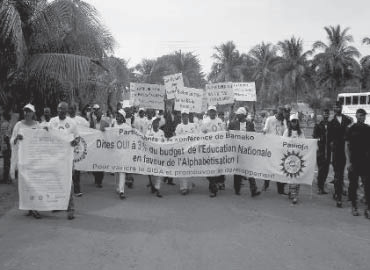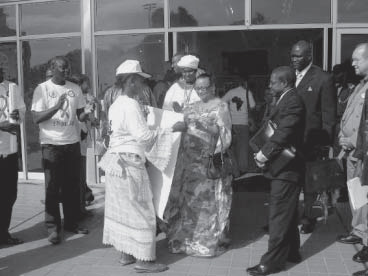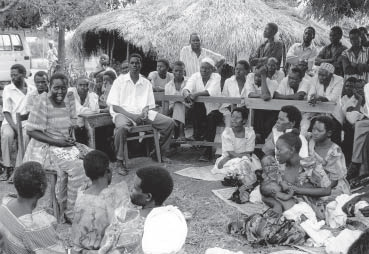Diarra Mahamadou Cheick
Based on a global survey of effective adult literacy programmes, the Global Campaign for Education (GCE), ActionAid and its partners de veloped the Adult Literacy Benchmarks to inform literacy policy and practice. They are of use to a range of actors (civil society, technical and financial development partners, communities) who are advocat ing and lobbying for adult literacy and will also help governments, the World Bank and the IMF to ensure that their resources contribute ef fectively to quality literacy for all. The Adult Literacy Benchmarks are mainly being shared through local, national, regional and international meetings, in a variety of formats, both printed and electronic. They are designed to be adaptable and flexible and this strategy particularly relies on critical feedback with a view to their future revision. It is therefore important to monitor the effects of diffusion: "What changes are en gendered by the diffusion and appropriation of the benchmarks by the actors concerned?" And crucially, "Who is involved in the process and how?" This article by Diarra Mahamadou Cheick of the NGO Jeunesse et Développement in Mali is a critical analysis of actions for advocacy linked to the International Benchmarks on Adult Literacy in the context of West Africa.
West Africa: Critical Reflections on the Cam paign for EFA and the Adult Literacy Benchmarks
Today we live in a world of profound change marked by conflicts of interest between different groups and classes. At the same time infor mation is the most dangerous of weapons used and/or manipulated by different factions to attain their ends.
Among the different groups there are three main categories:
- The marginalised
- The privileged
- The seekers of equality
The seekers of equality include all those who love justice and work for a better world – which means quality services for everyone. This group is heterogeneous in that it is made up of representatives of the other two groups: the marginalised and the privileged. However, the people most active in these social movements (representatives of NGOs and CSOs, bilateral, multilateral, government, private sector, etc.) are in the large relatively privileged. This article looks at the involvement of the most marginalised in the Adult Literacy Benchmarking process and at how a literacy caravan in West Africa succeeded in putting them at the centre of the process.
PAMOJA West Africa's Caravan, March and Press Conference
PAMOJA is the African network of practitioners and adherents of Reflect, an approach to community development that puts an analysis of power dynamics at the centre of learning, as a way of empowering the excluded and the marginalised. Reflect was inspired by the theories of the Brazilian educator, Paolo Freire, by PRA (Participatory Rural Appraisal) and communication techniques.
In preparation for the UNLD African Regional Meeting that took place in Bamako, Mali, in September 2007, PAMOJA West Africa organised a series of actions in favour of literacy and the prevention of HIV/ AIDS, working in partnership with DVV International, ActionAid and the GCE.
A caravan bringing together Reflect practitioners from Conakry in Guinea, Mali and Senegal travelled across these three countries with the aims of:
- Mobilising communities (local decision-makers, facilitators and participants in Reflect circles) around the event of the UNLD Re gional Conference in Bamako to encourage them to reinforce their stand in favour of literacy and the fight against HIV/AIDS in their local contexts.
- Informing communities and raising local awareness of the campaign for literacy and the fight against HIV/AIDS.
- Collecting pleas, demands and points of view from these com munities with a view to influencing the decisions to be taken at the conference in Bamako.
- Initiating a framework for regional consultation around the trilogy of literacy, HIV/AIDS and development in order to strengthen national planning across these sectors.
As part of this process, the benchmarks were widely diffused through conferences and round table discussions in many towns and villages through which the caravan passed. The caravan enabled communi ties to be informed about the campaign and also collected their com ments and testimony concerning literacy and HIV/AIDS.

West Africa's Caravan, Source: ActionAid
Some of the testimonies and comments collected in communities along the way:
Guinea Conakry
Maimouna Sow, a Reflect circle participant:
“We demand at least 3 % of the [education] budget to develop literacy so that we can resolve our difficulties, manage our households and support and help our children who are in school.”
Aissata Diallo, a housewife and trader:
“As a literate woman I am able to use my knowledge and competence in my commercial activities, which is why I am asking politicians to make it possible for all women to be literate whatever it costs.”
El Hadj Amadou Barry, the 1st Imam of Hafia:
“Knowledge isn’t only attained through instruction; it is something that a human must search for from the cradle to the grave, wherever he may be. So I am launching an urgent appeal to governments to invest a lot of resources in literacy in favour of the development of our communities.”
El Hadj Mamadou Moron Diallo, another Imam:
Making allusion to a passage of the holy Koran:
“Knowledge has no equal on this earth. One day God asked one of his prophets: which would you prefer to have, knowledge or power? Knowledge replied the prophet, so God gave him both. This is to tell you that he who has knowledge also has power. Today we need the whole population to be literate to fight against poverty.”
Mali
Sanoussi Makalou, a member of a Reflect circle:
“The problem is at two levels, the cost of literacy and the end result: communities certainly like literacy, but they can’t afford it; once a learner finishes his training he doesn’t know what to do with what he has learnt – we need to move towards literacy professionalism and for that the 3 % that you are asking for isn’t enough – the government must go further than that.”
Senegal
Mamou Cissé, an elected commune councillor from Diossong:
“I invite you to speak for the women of Diossong at this coming conference. NGOs certainly help us and do their best concerning literacy but it has to become a government priority.”
NDiaye Diouf, a Reflect facilitator:
“The state builds a school in nearly every village, but you can cover hundreds of kilometres without seeing a literacy centre built by the government. The centres that you see are the work of NGOs and associations with very limited means. The status of literacy teachers also needs to change and their training should result in a diploma.”
Mme Traoré Fanta Kondé, member of a commune council, delivered the following message in Bambara, Wolof and Fulani:
“We, the women, make up more than 52 % of the population, and out of every five women that you meet only one knows how to read and write. There are six women on the Commune council and I am the only one who is literate and this works against us when decisions are taken. We welcome with open arms this advocacy in favour of literacy that we think is going to write a wrong that has been done to women where education is concerned. I also think that since there is a World Day for Literacy, it is time to create a Minister responsible for Literacy in our governments with the necessary resources to eradicate
illiteracy and contribute to the realisation of sustainable development; women’s literacy centres also need to be supported by other activities, for example income generating activities and gardening… because the poor literacy rate among women is related to their numerous domestic duties and the time that they have to devote to income generation, which doesn’t leave them time to attend literacy classes.”
The director of a Regional Education Office:
“We need more resources to create literacy centres instead of limiting ourselves to those created by NGOs. The local authorities to which this responsibility was transferred don’t have enough resources. If the population isn’t literate there is very little participation in the development of the area. It is really an obligation of our governments to invest in adult education in order to respect the agreements that they have ratified. Literacy cuts across everything and each Ministry should have a literacy department”.
The testimonies presented here link closely with the EFA objectives, the MDGs and the spirit behind the benchmarks. It is clear that these people from marginalised environments and sections of society can strengthen the different campaigns and movements in favour of education. They constitute a critical mass that, once informed, is indispensable for the success of the advocacy actions that are underway.
The March and the Declaration
The information collected by the caravan was used to write the "Bamako Declaration" and a march of African civil society was or ganised to:
- Present the Declaration to the authorities attending the UNLD Africa regional conference
- Inform the general public of the principal demand: At least 3 % of the education budget for literacy (also Benchmark 12).
"In presenting the final Declaration from the caravan, we hope that this 2007 African Regional Conference in Bamako will be marked by new concrete financial and operational commitments, by both national governments and technical and financial development partners."
The Declaration is Presented to the Director of UNESCO's Regional Office for Adult Education
The Adult Literacy Benchmarks were also presented to delegates at the UNLD conference, which brought together an impressive collec tion of ministers, government officials and civil society actors to focus on adult literacy. The conference recognised that the benchmarks of fer a practical framework for moving forward. Key recommendations consistent with the benchmarks found their way into the conclusion of the conference.

Presentation of the West-Africa-Declaration Source: ActionAid
After the conference the commitments made by the dignitaries and elected representatives (First Ladies, Ministers and Presidents) were followed up. A number of positive results can be noted:
- The conference report stressed the demand for 3 % of the educa tion budget to be allocated to literacy.
- Ministers responsible for literacy were appointed in Benin, Mali and Senegal.
- A national policy for non-formal education was finalised in Mali and a draft policy was developed in Niger.
- There was an increase in the resources allocated to literacy in sev eral countries: 2 % of the education budget in Senegal and 3 % in Mali.
- Special literacy programmes were introduced by a number of First Ladies and Presidents. In Niger and in Guinea Conakry First Ladies are working to support the setting up of such literacy programmes. In Mali there is the start of a special President's literacy programme. In Senegal the President has allocated a special fund for literacy. and
- The Fast Track Initiative (FTI) agreed to take literacy into account in their funding for Benin and Burkina Faso.
Some Achievements of the EFA Campaigns
There has been a palpable renewal of interest in literacy as a result of campaigns internationally. This is demonstrated by a number of initiatives, such as:
- The United Nations Literacy Decade (UNLD);
- LIFE (Literacy Initiative for Empowerment), which is the framework for putting the UN Literacy Decade into practice. LIFE embraces 35 countries that have either an illiteracy rate of more than 50 % or more than 10 million people who cannot read and write;
- The increasing frequency of international, regional, sub-regional, national and local meetings concerning literacy;
- The multiplicity of research to support advocacy at all levels and the appearance of better structured networks and platforms in different continents. We can also note a significant advance in the functioning of civil society organisations;
- The progressive taking into account of literacy and non-formal education by coalitions, campaigns and policies;
- The partial achievement of EFA in some countries; and
- An ever increasing political will at international, regional and national levels.
The Problem
However, we need to remain vigilant because fine speeches and fine actions have always been part of the social and political environ ment. These results are minimal in comparison with the enormity and urgency of the issues and they need to be followed up to ensure that they make the difference for marginalised people. It is not enough to simply increase the resources available; this alone will not suffice if the other benchmarks are not taken into account. So far, no country has been able to apply the whole range of different benchmarks and thus create a synergy between them. Certain elements are taken into account, while others are left untouched.
It is important to consider how the increase in resources or implemen tation of the benchmarks will impact on the lives of marginalised peo ple. How can we guarantee that these resources are well managed? At this level citizens' monitoring can be an effective tool. However, these actors are not sufficiently involved in the campaigns and in most cases are not aware of the commitments and achievements. Until now, these campaigns in favour of literacy have been largely the domain of academics or intellectuals and we do not provide space for the marginalised themselves. Thus, those who are the victims of these injustices are excluded from the campaigns that are carried out in their name. Interestingly, the reasons for their marginalisation by those whom we say we are fighting are almost the same as those that push us to exclude them from these processes.
Let us examine some of those reasons:
- Insufficient ability to read, write and calculate;
- Incapacity to use the languages of communication or official languages;
- Insufficient human, financial and material resources for the inclu sion of marginalised people.
The world has changed and so have the sources of power. While, in history, physical strength was originally among the primary sources of power, these evolved to include land tenure, the control of armies and workers, and industrial ownership. Today the source of power is concentrated in one element: Information . In our modern-day socie ties it is usually the person who can access and control information that holds the power. And to access quality information at the right time it is necessary to know how to read, write and calculate. Added to that is the capacity to use the Internet, which is increasingly important in the processes of inclusion and exclusion. Those who are active in campaigns and movements use this means of communication, which is largely unfamiliar to those who suffer most from illiteracy. Language and the capacity or incapacity to manipulate it is at the root of exclu sion at all levels. And in the current order any attempt at translation and/or interpreting is prohibitively expensive and not a priority in the eyes of those who already have this power. So the automatic ques tion to be asked is "What is to be done?" Unfortunately the answer in most cases is to work with those who already have these capacities rather than moving towards alternatives that take into account the realities of marginalised people and finding better adapted means of communication.
A Return to the Grassroots
Overall, the campaigns in favour of EFA, including the Adult Literacy Benchmarks, are bearing fruit, even if progress varies according to the country and the sector. The literacy sector is increasingly the object of reflection and polemic because the interests of decision-makers (the privileged group) are at stake. It is not unusual to hear this group com plain that "You have stirred up the community against us" or "You're sowing disorder by giving our budgets to the people." In analysing these statements we see that the one complaining is the oppressor and his resistance concerns the defence of his privileged status and not the interests of a community or country. Of course the power rela tions will change profoundly once the different groups can access all the information that is available to those who hold the power. We can also transpose this analysis to the international arena asking:
"What do the privileged (governments of developed countries, multinationals) gain or lose if they have to face peoples of the South who are well educated and capable of taking part in decisionmaking at the macro level?"
Poverty, HIV/AIDS, corruption, bad management, discrimination and marginalisation of certain groups (due to sex, race, ethnicity and po litical affiliation), conflicts and wars are woes shared by all countries with high numbers of illiterate people. Advocacy actions, such as the production and diffusion of the Literacy Benchmarks, are intended to help change this situation, but it is important to recognise that there are inadequacies in the various missions and strategies. The involvement of the people in whose name the benchmarks and other initiatives have been launched has been limited. The benchmarks and other strategic documents must be disseminated in local and national languages using appropriate channels of communication so that the people most concerned can take ownership of the values that are at the heart of the campaigns and movements. Education is an inalienable right but information is no less so, especially when it concerns people's lives and their environments. Empowerment comes from building mar ginalised people's capacity to exercise and reclaim their rights.
Moving towards a more formal evaluation of the impact of the dis semination of the benchmarks at a validation and planning workshop, one which involves marginalised people as well as civil society or ganisations, researchers and United Nations actors, should be one of the priority activities in preparation for CONFINTEA VI (International Conference on Adult Education) in 2009 in Brazil, at least if we want to make a difference.

Class in Gambia
Source: Liba Taylor/ActionAid

Literacy class in Uganda
Source: Gideon Mendel/Corbis/ActionAid


